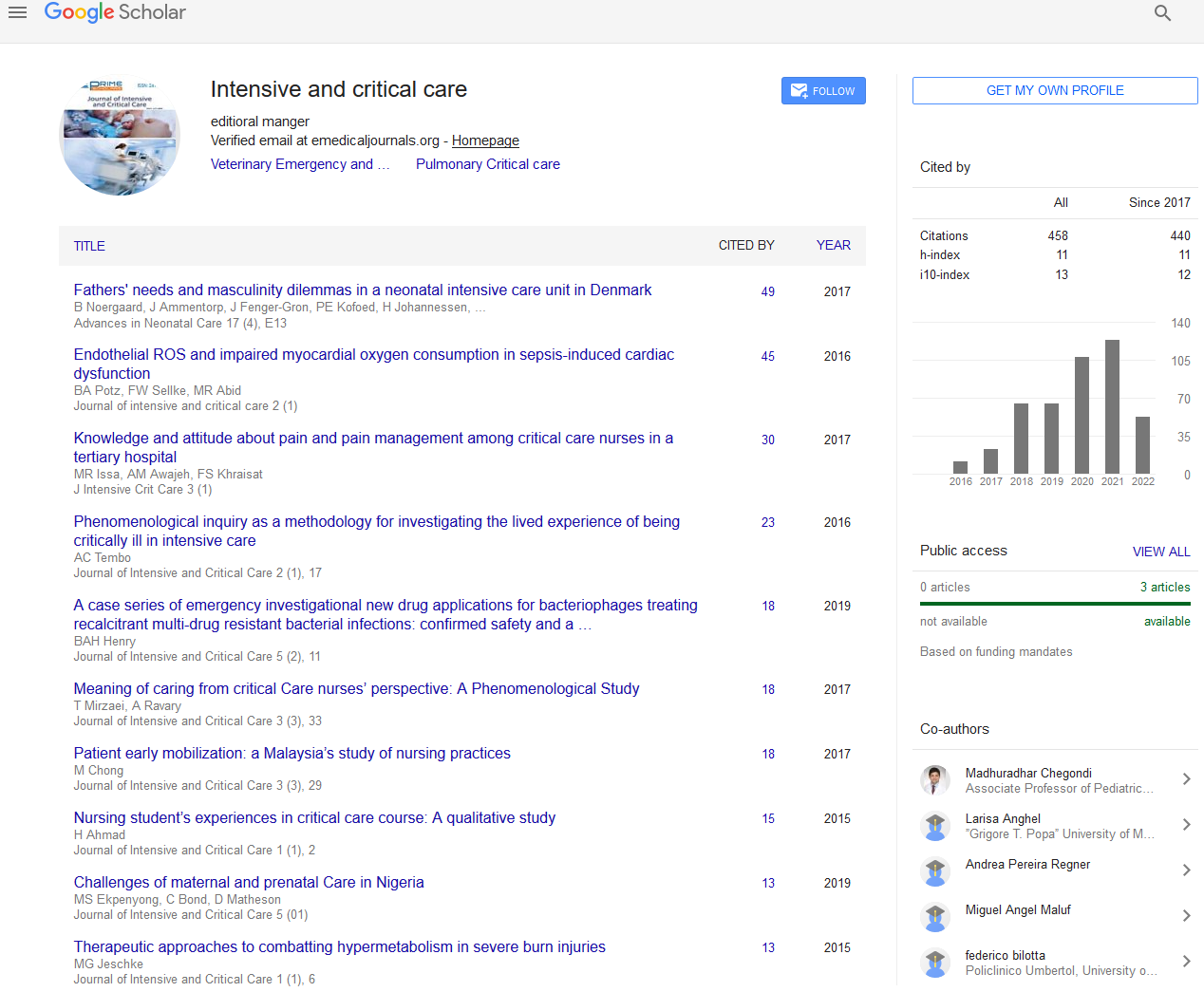Rieko Matsuura*
School of Nursing, University of Human Environments, Ohbu-City, Aichi, Japan
- *Corresponding Author:
- Rieko Matsuura
School of Nursing, University of Human Environments
Ohbu-City, Aichi, Japan
Tel: +81-562-38-7093
E-mail: r-matsuura@uhe.ac.jp
Received Date: August 29, 2018 Accepted Date: October 20, 2018 Published Date: October 27, 2018
Citation: Matsuura R (2018) Short Commentary on Factors Related to Self-Esteem among Psychiatric Nurses: Including Experience of Developing Negative Feelings toward Patients. J Intensive Crit Care Vol.4 No.3:15 doi: 10.21767/2471-8505.100117
Commentary
This study of ‘Factors Related to Self-Esteem among
Psychiatric Nurses: Including experience of developing negative
feelings toward patients’[1] is research that reports factors
related to self-esteem among psychiatric nurses including the
experience of developing negative feelings toward patients.
Nurses attach importance to good relationships with patients
to accomplish nursing purposes. However, patients in distress or
with impaired cognitive functions due to illness may occasionally
display unreasonable behaviours toward nurses. Although
nurses earnestly try to understand the import of the behaviours
of patients, and act to the benefit of the patients, there are
cases where nurses develop negative feelings towards patients,
presenting ethical conflicts [2]. The present study is useful to
assist psychiatric nurses to develop careers in a sound manner
while maintaining self-esteem.
In this study, a self-administered questionnaire survey was
conducted with 737 nurses working in nine non-public
psychiatric hospitals in one region of Japan. The questionnaire
included questions about “demographic”, “working environment
factors: it including the Negative Feeling toward Patient
Frequency scale (NFPF) [3], a scale that measures the experience
of negative feelings objectively”, “mental health” and Japanese
edition [4] of Self-Esteem Scale by Rosenberg [5]. Using the total
score of a self-esteem scale as the dependent variable, a
multiple regression analysis was conducted. Factors that showed
statistically significant correlations are high environmental
mastery dislike for the experience of negative feelings toward
patients, respondent being married, presently assistant head
nurse, coping behaviour by discussing with relevant persons
when having concerns at the workplace, and respondents who
had been working longest in surgery wards. The findings suggest
the effectiveness of providing the following support: (a) to
prevent developing excessive feeling of dislike when
experiencing negative feelings toward patients, (b) to help
acquire skills and understanding to know how to assist patients
as a means to control the human and physical environments
including psychiatric nurses themselves, and (c) to develop
coping strategies for communication with those involved when
encountering negative events at the workplace.
The findings of this study may not be generalizable as the
study subjects are limited to a specific region of Japan, and
because the study employed a cross-sectional design. However,
the study significance lies in showing a conflict for nurses in
relation to the self-esteem of psychiatric nurses, and uses the
Negative Feeling toward Patient Frequency scale (NFPF). Nurses
are specialists, trained to practice the sense of ethics that
respects the rights and dignity of patients. This is a reason
nurses tend to regard it as inappropriate to harbour negative
feelings toward patients. It is natural for people to experience
unstable emotions, both positively and negatively when
interacting with others. However, if nurses focus on the
discipline shown in the Code of Ethics for Nurses and on the
discussion of nursing ethics related to decision making of
patients, nurses may come to blame themselves for having
negative feelings toward patients without knowing how to deal
with and react to the negative feelings [2]. In other words,
conflicting “feelings”, a primitive emotion, are different from
conflicts based on rationally developed conclusions, and it is
difficult to cope with such conflicts only by establishing ethical
norms and decision processes, as well as by the commonly
offered proposals for solving “negative feelings”. If it is possible
for nurses to distinguish between unstable emotions and efforts
to respect the rights and dignity of the patients, these feelings
toward patients may protect nurses from developing excessively
strong feelings of dislike toward themselves, to maintain pride as
a nurse, and not inhibit a positive career development.
For the future, it is required to emphasize respect for the
rights and dignity of patients, as well as maintain good
relationships, closely observing situations that generate negative
feelings, and expand the scope of discussions for the
development of nursing ethics in accordance with clinical
settings to help nurses develop careers in a healthy manner
References
- Matsuura R, Suzuki E (2017) Factors Related to Self-Esteem among Psychiatric Nurses: Including experience of developing negative feelings toward patients. Japan Academy of Nursing Science 37: 319-328.
- Matsuura R (2010) Ethical Conflict of Nurses with Negative Feelings to Patients. The Journal of the Japan Academy of Nursing Administration and Policies 14: 77-84.
- Matsuura R, Suzuki E (2014) Developing a Negative Feeling Toward Patient Frequency Scale. Japanese Journal of Human Science of Health-Social Services.
- Yamamoto M, Matsui Y, Yamanari Y (1982) The Structure of Perceived Aspects of Self. The Japanese Journal of Educational Psychology 30: 64-68.
- Rosenberg M (1965) Society and the Adolescent Self-Images. Prinston Univ Press 21: 1-11.

